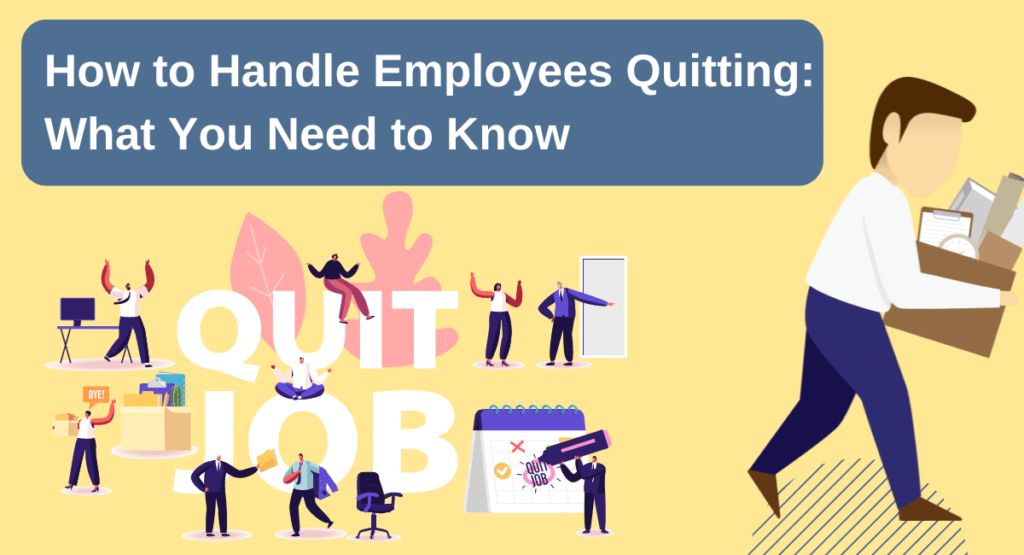Employees are Quiting – What to Do?


Employees quitting can be a difficult experience for any business owner. It’s hard to deal with the fact that someone you hired and trusted has decided to leave.
But don’t worry. We’re here to help! We will inform you what you need to do when an employee quits.
We’ll talk about how to handle the situation gracefully and ensure that the quitting process goes as smoothly as possible for everyone involved.
Read on how to deal with employees quitting!
What to do when an employee quits
It can be challenging to lose a valued team member, but it is essential to remember that this happens. Employees come and go, but the company will always remain.
Once you have calmed down, it is time to start thinking about the following steps to replace the employee who has quit. Companies can begin advertising the position, interviewing candidates, and training the new hire.
Companies should reflect on why their employees quit. Was there something that you could have done differently? Is there something that you can change to prevent employees from leaving in the future? These are essential questions to ask yourself to improve your business.
Employees quitting is never easy, but it is a part of doing business. By being prepared and taking action, you can ensure that your company continues running smoothly even when team members come and go.
Manage Emotions Effectively
Managing an employee’s resignation can be challenging, but keeping things calm and rational is essential. Below are some tips on managing emotions effectively:
- If the resignation was due to personal reasons, try and provide them with a suitable reference. The reference will help them move on with their life healthily and avoid future conflicts or misunderstandings.
- Do not overreact when an employee resigns. It might seem the perfect solution initially, but it will only worsen matters in the long run. Try your best to stay level headed and allow time to process what has happened calmly for you and the employee.
- Finally, take care not to judge or criticize too harshly; this could lead to further tension between you. Remember that giving someone emotional support is more than simply offering words of consolation; it’s about acknowledging their feelings while trying to encourage them toward new paths.
Maintain Positive Relations
It can be difficult to let go of employees, and the resignation process is always delicate. However, it is essential to remember that an employee is a human being with feelings and emotions.
Ensure you are sensitive to their feelings and what will make them feel better – giving them proper notice or acknowledging their work during their time at the company. Maintaining a positive relationship with your ex-employees after they resign goes a long way in preserving good ties between both parties.
A good relationship will help avoid any potential misunderstandings or resentment down the line.
Take Time to Reflect on the Employee’s Role in Your Business
You could reflect on why the employee decided to go and their role within your business.
The reflection will help you devise a plan to replace them or adjust their position more appropriately. After putting all this together, don’t make hasty decisions that might damage your business somehow.
Ensure you have enough information before moving – this will ensure that everything goes smoothly without any hitches.
Be Honest and Reconcile the Differences
When employees leave the company, being honest and upfront about why they are leaving is crucial. At the same time, you should clarify that you appreciate their contributions and wish them all the best in their future endeavors.
Resolve any unresolved differences between you two as quickly as possible so you can move on without lingering bitter feelings.
Offer a Severance Package
It is always difficult to lay someone off, but it is important to do so in a dignified and sympathetic way. Communicate with your employees before they resign and tell them that you value their work.
Offer them a severance package that reflects the time they have spent at the company – make sure it’s fair and doesn’t penalize them for leaving advantageously. Additionally, be understanding of their feelings and keep supportive communication channels open.
Evaluate the situation
When an employee resigns, it is essential to take appropriate action according to the company’s policy to avoid potential conflicts or misunderstandings.
Evaluate the situation and decide the following actions for things to return to normal as soon as possible.
A clear understanding of what led an employee into quitting is essential if management wants to try and understand why they left and make amends where necessary. Informing employees about their rights upon resignation goes a long way in preserving relationships while still enforcing company policies.
Consider your options for replacements.
A clear plan is essential, so you don’t make any mistakes during the transition. It is also necessary to ensure that your team’s morale remains high throughout this process.
Provide them with a supportive environment and remind them why they joined your company in the first place – not just during these challenging times, but constantly.
It’s also helpful to keep communication channels open, so everyone knows what’s happening and feels involved in the process. Remembering that making mistakes is part of life will help minimize stress levels while going through this challenging time.
When an employee resigns, it is essential to keep track of all conversations related to the same. The records will help avoid misunderstandings and ensure that both parties are on the same page.
It is also essential to be understanding and professional during these difficult times – it can be tough. Still, companies must do it for business continuity and success to prevail.
Ensure you record this information until the employee has been properly discharged or a legal agreement is reached between both parties involved.
How to handle the situation gracefully?

When an employee quits, it is important to handle the situation gracefully. This means being professional and respectful to the employees who are leaving.
It is also essential to be understanding and accommodating. Try to avoid getting angry or upset. The upset will only make the situation more difficult for everyone involved. Instead, focus on staying calm and collected. Staying calm helps you to think more clearly about the next plan.
It is also important to remember that employee quitting is not personal. Sometimes employees leave because they have found a better opportunity elsewhere. They may also leave for personal reasons such as family or health issues.
Making sure the quitting process goes smoothly
The quitting process should be smooth for both the employees who are leaving and the company itself. Ensure the company has a clear and concise resignation policy in place. This policy should outline how employees should go about resigning from their position. It should also state what type of notice is required and how much time employees have to complete their duties before they leave.
You should ensure that all employees access the resignation policy. This way, there is no confusion among employees when someone decides to quit.
Third, you should try to be as flexible as possible when it comes to the quitting process. Employees may need some time off before they leave or want to work out a different schedule to tie up loose ends.
By being flexible, you can show that you are understanding and accommodating. Cooperation will help to make the transition smoother for everyone involved.
Additional tips for dealing with employees quitting

Employees quitting is always a problematic situation for managers. In addition to finding and training a replacement, there is also the potential for disrupting morale among other employees.
The company must be proactive in identifying those who may be considering it. Companies can identify by paying attention to changes in behavior or attitude, such as increased absenteeism or decreased productivity.
If employees seem disengaged from their work, it may indicate that they are not committed to the organization and are more likely to quit. Another way to deal with the problem is to ensure that job descriptions are clear and accurate.
Clear job descriptions will help set expectations for employees and minimize frustration if they feel their job is not what they expected. Additionally, managers should create a positive work environment where employees feel valued and appreciated. A positive working environment can help reduce employees’ temptation to quit and look for a better situation elsewhere.
There is no guaranteed way to prevent employees from quitting. Following these tips can help minimize employee turnover’s impact on your organization.
Reasons employees quit their jobs.

There are many reasons employees may decide to quit their jobs, but some of the most common reasons are lost productivity and work-life balance.
When employees feel like they can not have career advancement or that their work is no longer fulfilling, they may start to look for other opportunities. This can lead to lost productivity as employees spend more time looking for new jobs instead of focusing on their current roles.
In addition, employees may quit if they feel like they are working too much and not having enough time for friends and family. While some employers offer flexible work schedules or telecommuting options, others do not, leading to frustration and, eventually, resignation.
Ultimately, lost productivity and work-life balance are two of the most common reasons employees quit their jobs.
What to do if an employee quits for good?

If an employee quits for good, it’s essential to take some time to reflect on what may have led to their decision. They could be unhappy with their current career advancement prospects.
Either way, it’s important to take steps to prevent similar situations from happening in the future. Employee development could involve providing training and development opportunities or offering career counseling services.
Investing in your employees can help create a more positive work environment and prevent them from quitting for good.
What to do if an employee quits without warning?
Losing an employee can be a big blow to any business, but it can be complicated when the employee quits without warning. Not only does it leave you short-staffed, but it can also be a blow to morale.
Companies can minimize the damage. First, try to understand the workers’ mentality. Quiet quitters usually have something else lined up, so they’re not as worried about notice periods or finding another job.
Second, your friend contact is an excellent way to find a replacement for the quitting employee.
Finally, try to learn from the situation. By taking time to reflect on the case, you can help to prevent future quitters.
Frequently Asked Questions
What should I do if an employee quits without providing a reason?
If an employee quits without reason, it is usually best to handle the situation professionally. Professionally means understanding their decision and taking measures to keep things friendly.
However, suppose the employee does not provide a proper explanation for quitting or does anything that would cause animosity or conflict.
In that case, it is advised to take measures such as issuing a resignation letter and providing a severance package. This would cover the employee’s lost wages for a certain period.
What are tips that I can take to prevent future employee departures?
There are a few things that you can do to help prevent future employee departures.
1. Make sure that your policies and procedures are clear and concise. Clear policies and procedures will help employees know their rights and obligations.
2. Promote a positive work environment where employees feel appreciated and express themselves freely. Appreciation will encourage them to remain with your company for a longer period.
3. Have an effective disciplinary process to deal with issues before they escalate further. This way, you can resolve disputes or complaints fairly and promptly, keeping your team morale high.
4. Offer competitive salaries, benefits, and leave time options to encourage employee loyalty. New salary or benefits packages will make employees more likely to stay with your company for a long time.
Final thoughts
So, you’ve been through the process of hiring and training employees, only to have them quit on you. It’s a challenging experience, but it happens to everyone at some point. It is important to know how to handle it when it happens.
When employees quit, don’t take it personally. It happens to everyone, and it’s not a reflection on you as a manager or a person. Try to find out why they’re quitting. Was it something you did? Is something going on at the company? Or was it simply a case of them not being a good fit for the job?
Finally, don’t dwell on it. Yes, it’s disappointing when employees quit but remember that plenty of other great employees would love to work for you. So focus on finding those employees and making your company the best workplace.


